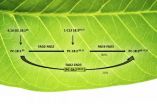(Press-News.org) Scientists showed that people who have a variant of a longevity gene, called KLOTHO, have improved brain skills such as thinking, learning and memory regardless of their age, sex, or whether they have a genetic risk factor for Alzheimer's disease. Increasing KLOTHO gene levels in mice made them smarter, possibly by increasing the strength of connections between nerve cells in the brain. The study was partly funded by the National Institutes of Health.
"This could be a major step toward helping millions around the world who are suffering from Alzheimer's disease and other dementias," said Dena Dubal, M.D., Ph.D., an assistant professor of neurology, the David A. Coulter Endowed Chair in Aging and Neurodegeneration at the University of California San Francisco (UCSF) and the lead author of the study published in Cell Reports. "If we could boost the brain's ability to function, we may be able to counter dementias."
As people live longer the effects of aging on the brain will become a greater health issue. This is especially true for dementias, a collection of brain disorders that can cause memory problems, impaired language skills and other symptoms. With the number of dementia cases worldwide estimated to double every 20 years from 35.6 million people in 2010 to 65.7 million in 2030 and 115.4 million in 2050, the need for treatments is growing.
Klotho is the name of a Greek mythological goddess of fate, "who spins the thread of life." People who have one copy of a variant, or form, of the KLOTHO gene, called KL-VS, tend to live longer and have lower chances of suffering a stroke whereas people who have two copies may live shorter lives and have a higher risk of stroke. In this study, the investigators found that people who had one copy of the KL-VS variant performed better on a battery of cognitive tests than subjects who did not have it, regardless of age, sex or the presence of the apolipoprotein 4 gene, the main genetic risk factor for Alzheimer's disease.
"This study shows the importance of genes that regulate the multiple aging processes involved in the maintenance of cognitive function," said Suzana Petanceska, Ph.D., program director in NIA's Division of Neuroscience. "Understanding the factors that control the levels and activity of KLOTHO across multiple organ systems may open new therapeutic avenues for prevention of age-related cognitive decline and dementia."
The investigators tested a variety of cognitive skills, including learning, memory, and attention. More than 700 subjects, 52 to 85 years old were tested as part of three studies. None had any sign of dementia. Consistent with previous studies, 20 to 25 percent of the subjects had one copy of the KL-VS variant and performed better on the tests than those who had no copies. Performance on the tests decreased with age regardless of whether a subject had one or no copies of the KL-VS gene variant.
The KLOTHO gene provides the blueprint for a protein made primarily by the cells of the kidney, placenta, small intestine, and prostate. A shortened version of the protein can circulate through the blood system. Blood tests showed that subjects who had one copy of the KL-VS variant also had higher levels of circulating klotho protein. The levels decreased with age as others have observed. The researchers speculate that the age-related decrease in circulating levels of klotho protein may have caused some of the decline in performance on the cognitive tests.
"These surprising results pave a promising new avenue of research," said Roderick Corriveau, Ph.D., program director at NIH's National Institute of Neurological Disorders and Stroke (NINDS). "Although preliminary, they suggest that a form of klotho could be used to enhance cognition for people suffering from dementia."
To test this idea the researchers genetically engineered mice to overproduce klotho protein. The klotho-enhanced mice lived longer and had higher levels of klotho in the blood and in a brain area known as the hippocampus, which controls some types of learning and memory. Similar to human studies, the klotho-enhanced mice performed better on a variety of learning and memory tests, regardless of age. In one test, the mice remembered the location of a hidden target in a maze better, which allowed them to find it twice as fast as control mice.
Learning is thought to strengthen communication between nerve cells in the brain at structures called synapses. In the hippocampus, many synapses use a chemical called glutamate to communicate. Electrical recordings suggested that klotho makes it more likely these synapses will be strengthened during learning and memory.
NMDA receptors control communication at many glutamate synapses. GluN2B subunits are components of some NMDA receptors. Previous studies have shown that the presence of GluN2B at synapses is associated with changes in synaptic strength and learning and memory. In this study, the researchers found that synapses in the brains of klotho-enhanced mice had more GluN2B subunits than control mice. Treating klotho mice with a drug that selectively blocks GluN2B-containing NMDA receptors reduced their ability to perform on learning and memory tests. The results suggest that increasing the presence of GluN2B-containing NMDA receptors may be one way that klotho could enhance cognitive skills.
"Overall our results suggest that klotho may increase cognitive reserve or the brain's capacity to perform everyday intellectual tasks," said senior author Lennart Mucke, M.D., director of the Gladstone Institute of Neurological Disease, San Francisco, CA, and the Joseph B. Martin Distinguished Professor of Neuroscience, and professor of neurology at UCSF.
INFORMATION:
To watch Drs. Dubal and Mucke discuss their latest results showing how the KLOTHO gene may enhance cognition go to the following web link:
http://youtu.be/9zBj37nsvPE
This work was supported by grants from the NINDS (NS065780), the NIA (AG022074, AG034531, AG00001, AG18440, AG010435, AG019712, AG23501, AG19724, AG032289, AG025831, AG15819, AG17917), NCRR (RR18938, RR00865); gifts from the S.D. Bechtel Jr. and Coulter-Weeks Foundations; awards from the MetLife Foundation and the American Federation for Aging Research.
References:
Dubal et al. "Life extension factor klotho enhances cognition," Cell Reports, May 8, 2014. DOI: 10.1016/j.celrep.2014.03.076
For more information about dementia, please visit:
http://www.ninds.nih.gov/disorders/dementias/dementia.htm
http://www.nia.nih.gov/health/topics/dementia
NINDS is the nation's leading funder of research on the brain and nervous system. The mission of NINDS is to seek fundamental knowledge about the brain and nervous system and to use that knowledge to reduce the burden of neurological disease.
National Institute on Aging leads the federal government effort conducting and supporting research on aging and the health and well-being of older people. It provides information on age-related cognitive change and neurodegenerative disease specifically at its Alzheimer's Disease Education and Referral (ADEAR) Center at http://www.nia.nih.gov/Alzheimers.
About the National Institutes of Health (NIH): NIH, the nation's medical research agency, includes 27 Institutes and Centers and is a component of the U.S. Department of Health and Human Services. NIH is the primary federal agency conducting and supporting basic, clinical, and translational medical research, and is investigating the causes, treatments, and cures for both common and rare diseases. For more information about NIH and its programs, visit http://www.nih.gov.
Longevity gene may boost brain power
NIH-funded researchers discover the gene may enhance cognitive abilities
2014-05-09
ELSE PRESS RELEASES FROM THIS DATE:
Autism-related protein shown to play vital role in addiction
2014-05-09
BELMONT - In a paper published in the latest issue of the neuroscience journal Neuron, McLean Hospital investigators report that a gene essential for normal brain development, and previously linked to Autism Spectrum Disorders, also plays a critical role in addiction-related behaviors.
"In our lab, we investigate the brain mechanisms behind drug addiction – a common and devastating disease with limited treatment options," explained Christopher Cowan, PhD, director of the Integrated Neurobiology Laboratory at McLean and an associate professor of Psychiatry at Harvard Medical ...
Quick test can help spot depressed teenagers, UT Arlington nursing researcher finds
2014-05-09
A few minutes spent filling out a widely accepted mental health assessment in a health care provider's waiting room could make a big difference for some teenagers suffering from depression, according to new study from a nursing researcher at The University of Texas at Arlington.
Sharolyn Dihigo, a nurse practitioner and clinical assistant professor in the UT Arlington College of Nursing, recently examined available research to determine whether nurse practitioners and others in primary care settings should add a mental health screening to well visits for teenage patients. ...
Conducting polymer films decorated with biomolecules for cell research use
2014-05-09
The ability to create conducting polymer films in a variety of shapes, thicknesses and surface properties rapidly and inexpensively will make growing and testing cells easier and more flexible, according to a team of Penn State bioengineers.
"The ultimate goal of this collaborative project is to be able to create a substrate for growth and manipulation of cells," said Sheereen Majd, assistant professor of bioengineering. "Cells on a surface need to recognize biomolecules like extracellular matrix proteins to be able to adhere and grow. We ultimately would like to be able ...
Grape consumption may offer benefits for symptomatic knee osteoarthritis
2014-05-09
Fresno, CA – New research presented last week at the Experimental Biology conference in San Diego, California, suggests that regular grape consumption may help alleviate pain associated with symptomatic osteoarthritis of the knee, and improve joint flexibility and overall mobility. Researchers attribute these potential benefits to the polyphenols found in grapes.
The sixteen week clinical study, undertaken by Texas Woman's University, was designed to investigate the benefits of grape consumption on inflammation and osteoarthritis outcomes. 72 men and women with knee ...
Calcium supplements not associated with increased risk of cardiovascular disease in women
2014-05-09
Boston, MA – Calcium supplements are widely taken by women for bone health. Previous studies have suggested that calcium supplements may increase risk of cardiovascular disease, but the data has been inconsistent. A new study by researchers at Brigham and Women's Hospital (BWH) did not find that calcium supplement intake increases risk of cardiovascular disease in women.
The study is published online this month in Osteoporosis International.
Researchers examined supplemental calcium use and incident cardiovascular disease in a prospective cohort study of 74,245 women ...
Study validates air sampling techniques to fight bioterrorism
2014-05-09
ST. LOUIS – Air and surface sampling techniques currently used by the US government are effective in fighting bioterrorism and potentially saving lives, a Saint Louis University researcher finds.
Results published in Biosecurity and Bioterrorism by Alexander Garza, M.D., MPH, former chief medical officer at the Department of Homeland Security and a team of researchers from Los Alamos National Lab reviewed the data from a series of experiments simulating a bioterrorism attack against the Pentagon. Garza is now the associate dean for public health practice and associate ...
New species of metal-eating plant discovered in the Philippines
2014-05-09
Scientists from the University of the Philippines, Los Baños have discovered a new plant species with an unusual lifestyle — it eats nickel for a living — accumulating up to 18,000 ppm of the metal in its leaves without itself being poisoned, says Professor Edwino Fernando, lead author of the report. Such an amount is a hundred to a thousand times higher than in most other plants. The study was published in the open access journal PhytoKeys.
The new species is called Rinorea niccolifera, reflecting its ability to absorb nickel in very high amounts. Nickel hyperaccumulation ...
Plants' oil-desaturating enzymes pair up to channel metabolites
2014-05-09
UPTON, NY-Plant scientists at the U.S. Department of Energy's Brookhaven National Laboratory have found that certain enzymes responsible for desaturating fatty acids, the building blocks of oils, can link up to efficiently pass intermediate products from one enzyme to another. "Engineering these enzyme interactions to channel metabolites along desired metabolic pathways could be a new approach for tailoring plants to produce useful products," said Brookhaven biochemist John Shanklin, lead author on a paper reporting the results in the Journal of Biological Chemistry.
Getting ...
Leadless pacemaker showing promising results after 1 year
2014-05-09
Vivek Reddy, MD, Director of Arrhythmia Services for The Mount Sinai Hospital, reported his promising12-month follow-up data showing the world's first leadless pacemaker is demonstrating overall device performance comparable to conventional pacemakers. Dr. Reddy presented the one-year LEADLESS study data findings during his late-breaking clinical trial presentation on May 9 at Heart Rhythm 2014, the Heart Rhythm Society's 35th Annual Scientific Sessions in San Francisco, CA.
The LEADLESS study's long-term follow-up has evaluated 32 patients with a slowed heartbeat, bradycardia, ...
Scientists decode epigenetic mechanisms distinguishing stem cell function and blood cancer
2014-05-09
Researchers at Dartmouth's Norris Cotton Cancer Center have published results from a study in Cell Reports that discovers a new mechanism that distinguishes normal blood stem cells from blood cancers.
"These findings constitute a significant advance toward the goal of killing leukemia cells without harming the body's normal blood stem cells which are often damaged by chemotherapy," said Patricia Ernst, PhD, co-director of the Cancer Mechanisms Program of the Norris Cotton Cancer Center and an associate professor in Genetics at the Geisel School of Medicine.
The study ...
LAST 30 PRESS RELEASES:
Microalgae-derived biochar enables fast, low-cost detection of hydrogen peroxide
Researchers highlight promise of biochar composites for sustainable 3D printing
Machine learning helps design low-cost biochar to fight phosphorus pollution in lakes
Urine tests confirm alcohol consumption in wild African chimpanzees
Barshop Institute to receive up to $38 million from ARPA-H, anchoring UT San Antonio as a national leader in aging and healthy longevity science
Anion-cation synergistic additives solve the "performance triangle" problem in zinc-iodine batteries
Ancient diets reveal surprising survival strategies in prehistoric Poland
Pre-pregnancy parental overweight/obesity linked to next generation’s heightened fatty liver disease risk
Obstructive sleep apnoea may cost UK + US economies billions in lost productivity
Guidelines set new playbook for pediatric clinical trial reporting
Adolescent cannabis use may follow the same pattern as alcohol use
Lifespan-extending treatments increase variation in age at time of death
From ancient myths to ‘Indo-manga’: Artists in the Global South are reframing the comic
Putting some ‘muscle’ into material design
House fires release harmful compounds into the air
Novel structural insights into Phytophthora effectors challenge long-held assumptions in plant pathology
Q&A: Researchers discuss potential solutions for the feedback loop affecting scientific publishing
A new ecological model highlights how fluctuating environments push microbes to work together
Chapman University researcher warns of structural risks at Grand Renaissance Dam putting property and lives in danger
Courtship is complicated, even in fruit flies
Columbia announces ARPA-H contract to advance science of healthy aging
New NYUAD study reveals hidden stress facing coral reef fish in the Arabian Gulf
36 months later: Distance learning in the wake of COVID-19
Blaming beavers for flood damage is bad policy and bad science, Concordia research shows
The new ‘forever’ contaminant? SFU study raises alarm on marine fiberglass pollution
Shorter early-life telomere length as a predictor of survival
Why do female caribou have antlers?
How studying yeast in the gut could lead to new, better drugs
Chemists thought phosphorus had shown all its cards. It surprised them with a new move
A feedback loop of rising submissions and overburdened peer reviewers threatens the peer review system of the scientific literature
[Press-News.org] Longevity gene may boost brain powerNIH-funded researchers discover the gene may enhance cognitive abilities





